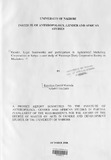| dc.description.abstract | In this study, I present the findings of a research project on gender, legal frameworks and
participation in Agricultural co-operatives. The study sought to assess the interaction of
gender, the various relevant laws (international, national and customary), and the socio-cultural
factors, which influence low participation of women in agricultural marketing cooperatives
(dairy) in Kenya, with special interest to Wamunyu Dairy cooperative in Machakos District.
The goal of this study was to investigate incidences of gender inequity in Diary marketing
cooperatives. And further look into what extent existing legal frameworks are the major causal
factors of such incidences, from the view points of co-operative male and female members and
other stakeholders.
Numerous studies across the globe have demonstrated how women have remained
marginalised from the mainstream sectors of development. Including how their confinement in
the often under valued social sector has isolated them. Of important concern has been women's
participation in political leadership and decision making levels. This concern has been
identified as one of the key indicators under the MDG's goal on gender equality and women
empowerment.
Cooperatives are important vehicles for empowerment since they allow individuals with a
common problem to come together to achieve goals that would not be otherwise achieved
while acting individually. However, despite the Co-operative principles and values that
proclaim equality, equity and democracy, gender imbalances abound. And this is largely so
because Co-operatives operate within a broader institutional framework. Within which rules,
norms and conventions expected to govern human behaviour are constructed, maintained,
reinforced, challenged and in some cases reviewed.
Since the World summit on social development (WSSD) and the Beijing conference, the
concern on the status of women in cooperatives has remained a top priority agenda for ICA'.
More so the issue of women's low level of active participation and their under-representation
in decision making and leadership.
A small scale, descriptive case study design has been employed. Both quantitative and
qualitative methods of data collection and analysis were used. Targeting selected male and
female; dairy producers; Co-operators; executive committee and staff members of Wamunyu
dairy Co-operative, Government officers from the Ministry of Cooperative development, as
well as other secondary Sources.
. A literature survey reviewed the international, national and customary legal frameworks as
they apply to women in Kenya. Since this is a contemporary phenomenon a case study method
was undertaken, in order to deliberately cover the pertinent contextual conditions. And seek to
provide a deeper understanding of the complex relationship between the cooperative legal
framework and the socio-cultural contexts. For the convenient of the researcher in organizing
logistics for data collection, Wamunyu Dairy Cooperative society, in Machakos district was
chosen. However, it represents a typical Diary cooperative society in semi arid areas of Kenya. | en |

